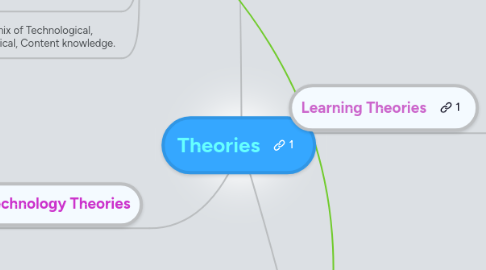
1. Technology Theories
1.1. Media Ecology
1.1.1. Technology influences society
1.1.2. Technology changes how we feel, what our values are, our understanding of life
1.1.3. Opposite of SCOT
1.1.4. If this is true, teachers have to be very careful what technologies they expose their students to, because technology influences people
1.2. SCOT
1.2.1. Social Construction of Technology
1.2.2. People influence technology
1.2.3. What society (so majority) believe to be important and necessary happens in technology advancements
1.2.4. Only countries that have the means to make great advancements in technology could sway the way technology is moving, so are there technologies that are needed by some who simply cannot develop it?
1.2.5. Are we limited by our own desires? Could we be learning more?
2. TPACK
2.1. Technological, Pedagogical & Content Knowledge: understanding of the complex interplay between PK, CK & TK.
2.2. The importance of teaching with technology (appropriately).
2.3. Framework for teachers to decide the role of technology in the classroom.
2.4. Technology influences content & pedagogy. Content & pedagogy influence technology.
2.5. Need a mix of Technological, Pedagogical, Content knowledge.
3. Philosophy of Teachnology
3.1. Your beliefs about how technology can and should be used in your teaching practices.
3.2. TPACK should inform your philosophy of teachnology.
3.3. What is my belief?
3.3.1. Technology has to be relevant and safe when used in the classroom. Adding technology just for the sake of it isn't useful. But technology in the classroom can be incredibly useful and appropriate.
4. Learning Theories
4.1. Cognitive Load Theory
4.1.1. Processing info can over or under load working memory
4.1.2. Error / Fundamental Attribution Error - learner thinks they are the problem because they are over/under stimulated
4.1.3. Our working memory has its limits, which can be an implication to learning
4.1.4. How information is presented and organized needs to be considered when teaching
4.2. Constructivism
4.2.1. "Learning by making"
4.2.2. Begin with complex problems and teach basic skills while solving
4.2.3. Teacher as Facilitator - Student acts as own teacher, teacher just helps
4.2.4. Constructing knowledge from personal experiences
4.2.5. Mature learners are necessary for this - can leave immature learners feeling frustrated or uninterested
4.3. Connectivism
4.3.1. Constructivism and Connectivism almost in opposition: constructivism you learn from own experiences, but with connectivism you learn from other's experiences.
4.3.2. Learning is creating connections and making a network
4.3.3. "A learning theory for the digital age"
4.3.4. Connections must be maintained to facilitate continual learning
4.3.5. Knowledge has to be shared between people
4.3.6. This is a "theory for the digital age", but what if you are educating in an area with little technology for making connections? What if you don't have access to the internet? Is it as successful then?
4.3.7. Constructivism and connectivism seem in opposition; with constructivism you learn through your own experiences, but with connectivism you learn through other's experiences
